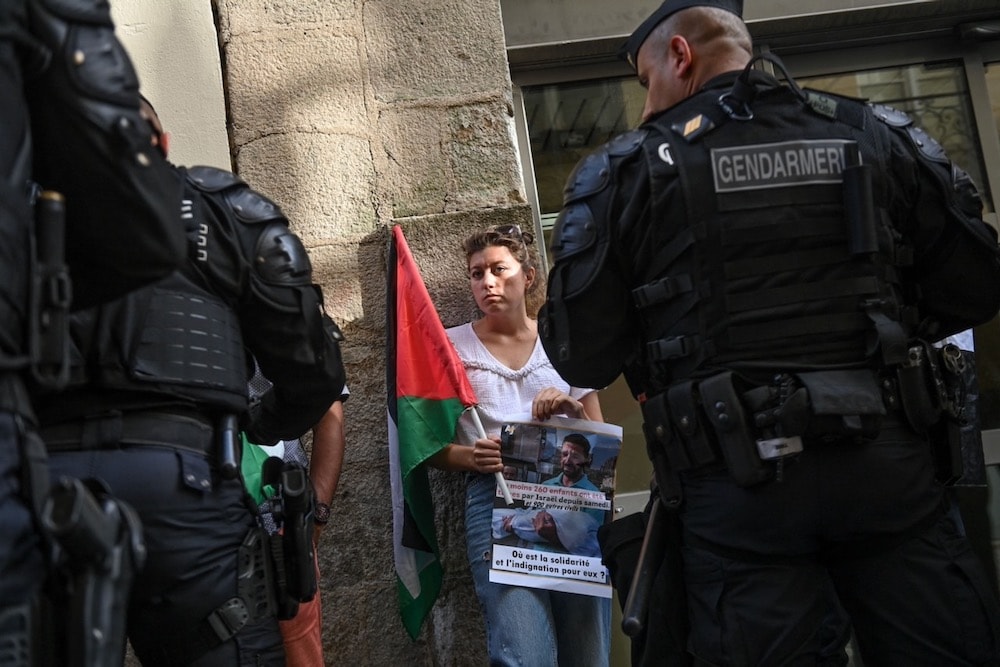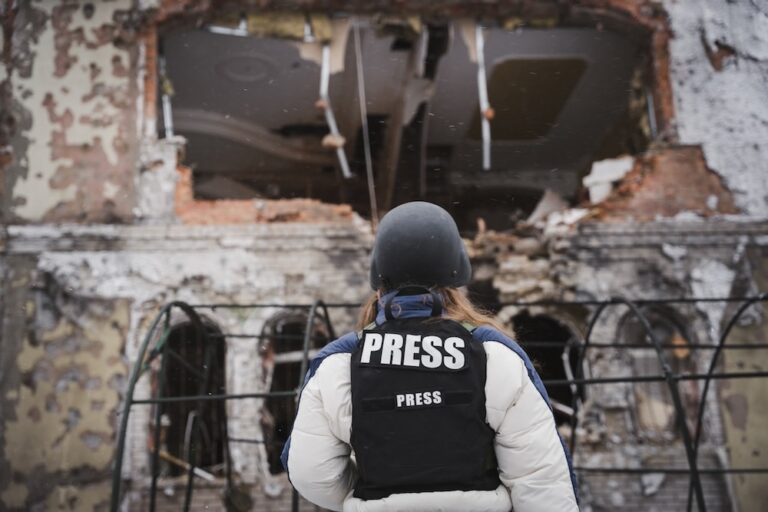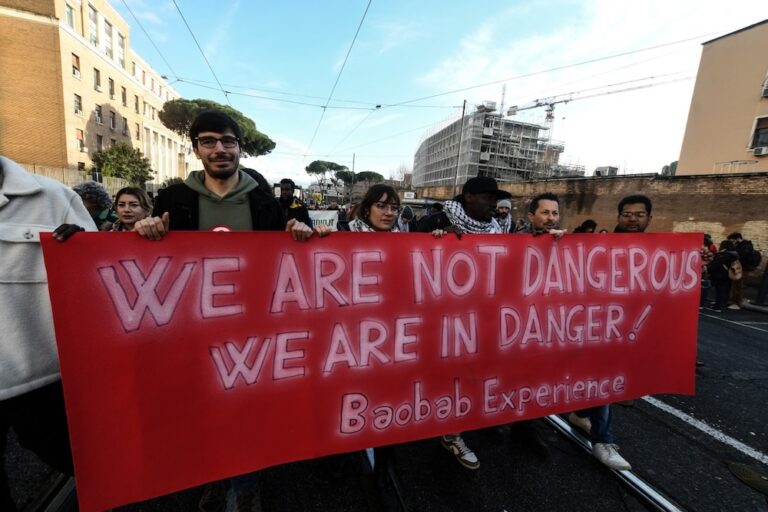"As the humanitarian catastrophe continues to unfold in Gaza, and increasingly in the West Bank, there must be freedom to voice opinions and to protest everywhere" - ARTICLE19
Ed. Note: At the time of publishing this piece, we at IFEX are bearing witness to the atrocious escalation of violence in Palestine and Israel. In this worrisome context, we express our firm solidarity with IFEX members MADA, 7amleh and I’Iam, and with our colleagues throughout the region, as the consequences of the conflict spread beyond their borders.
This statement was originally published on article19.org on 9 November 2023.
ARTICLE 19 is profoundly concerned by the actions and rhetoric of many European governments who risk failing to uphold rights to freedom of expression in the context of the Israel-Palestine/Occupied Territories war. We urge the governments of France, Germany, and the United Kingdom, and all governments across Europe, to recognise the crucial role these rights play in protecting democracies in times of conflict.
With these vital rights we are all enabled to hold our governments to account during a crisis. They provide checks and balances on executive overreach, and they have been hard won. We must not sacrifice these values based on fear of dissent. Yet in some countries where democratic values are usually defended to the hilt, we are seeing disturbing reactions to the current crisis.
In Hamas’ attack on Israel on 7 October, at least 1,400 people were murdered and more than 200 taken hostage. As of 8 November, at least 10,000 people have been killed in Gaza following airstrikes by the Israeli Defence Force (IDF). The Gaza Strip, home to more than 2 million people, is facing a dire humanitarian crisis due to the ongoing siege, with no access to water, food, or medical supplies.
The unfolding horror in Gaza is fueling profound concern in communities around the world and many cities have seen huge marches demonstrating solidarity with the civilians in Palestine, and calling for an end to the violence. We have seen both Arab and Jewish communities stand side by side, calling for an end to the war ‘for the sake of humanity’.
Meanwhile various politicians are using the situation to sow further division among the electorates they represent. Others have resigned their positions in protest at the stances taken by their parties. The French, German and UK governments have introduced restrictions in response to a stark rise in antisemitism and islamophobia, including threats of violence against Muslims and mosques and attacks on synagogues. Authorities have banned numerous pro-Palestine demonstrations and detained scores of people, citing the need to prevent incitement to violence or hatred. France and Germany, where the European Union’s largest Jewish and Muslim communities live, are experiencing particularly high tensions. Some demonstrations were also banned in Budapest, Vienna and several cities in Switzerland.
Restrictions in Germany
Germany has preemptively banned several gatherings in support of Palestine, framing its decision as a response to the increase in antisemitic incidents and public security concerns and a move to prevent ‘public celebration of the Hamas terrorist attacks’ of 7 October. Clashes between the police and protesters have resulted in mass arrests and injuries of both protesters and counter-protesters. There have been reports on the use of excessive force by the police, for instance the apprehension of a woman marching with an anti-war message, shoving people to the ground or stamping out candles lit in memory of killed civilians. On 13 October, police, together with the Berlin public prosecutor’s office, stated the slogan ‘From the river to the sea, Palestine will be free’ should be deemed a criminal offence. German authorities banned a ‘Peace in the Middle East’ rally on 22 October because they said it could lead to ‘seditious, antisemitic exclamations’ and ‘glorification of violence’ and in turn prompt violence.
On the same day, educational authorities in Berlin were informed that schools have the option to prohibit students from wearing the Palestinian flag, keffiyeh scarves, and “free Palestine” stickers. Banners referring to genocide or the Holocaust can be enough of a reason to apprehend or arrest a protester. These are not unprecedented actions but an escalation of previous restrictions on freedom of assembly; Previously, Berlin authorities also banned Nakba Day demonstrations and detained many of those who took to the streets despite the ban.
Restrictions in France
In France, Interior Minister Gérald Darmanin announced on 12 October a complete ban on pro-Palestine rallies, stating that these demonstrations must be prohibited ‘because they are likely to generate disturbances to the public order’. In a message addressed to all prefectures in the country, the minister also demanded the arrest of possible ‘organisers’ and ‘troublemakers’. Police have used tear gas and water cannons to disperse crowds joining unauthorised protests. Several gatherings were also banned due to a context of ‘extreme violence’ and the ‘proven risks of exporting this violence on national soil’. The country’s highest administrative court ruled that only local authorities can decide whether to outlaw a demonstration based on a case-by-case assessment. However, the court stressed that in light of the resurgence of anti-semitism in France, demonstrations in support of Hamas or those that ‘support or justify’ attacks on Israel can lead to violations of public order as indicated by the minister and thus Darmanin’s instructions ‘do not constitute a serious and manifestly illegal attack on freedom of demonstration and freedom of expression’. According to the Ministry of Interior’s data, as of 6 November, more than 1000 antisemitic attacks had taken place in France since 7 October.
Dangerous rhetoric in the UK
Though the UK has so far refrained from imposing an official ban on pro-Palestine demonstrations, top politicians have repeatedly attempted to marginalise or even target dissenting voices. Home Secretary Suella Braverman called pro-Palestine rallies ‘hate marches’, claimed that in some cases waving Palestinian flags could ‘glorify terrorism’, and urged the police to consider whether chanting ‘From the River to the Sea’ could express a ‘violent desire’. There was mounting pressure on the Metropolitan Police to prevent a rally scheduled for Armistice Day on 11 November in London, with Prime Minister Rishi Sunak calling the planned event “disrespectful” and instructing law enforcement to do ‘everything necessary to protect the sanctity of Armistice Day’. However, Metropolitan Police Commissioner Sir Mark Rowley stated on 8 November that the demonstration would go ahead, and that the threshold to ban it has not been met.
In addition, the government’s highly contested proposal to broaden the definition of extremism by including anyone who ‘undermines the country’s institutions and its values’ raises further concerns about the disproportionate and unjustified restrictions of the freedom of expression.
Freedom of expression and the right to protest under international law
Protection of freedom of expression and the right to protest is an essential part of a functioning democracy. Moreover, protest is often one of the most effective tools available for marginalised individuals and groups to successfully advocate for change. Constraints on the rights to freedom of expression and protest are only permissible in very limited instances and have to meet very narrow criteria. Such restrictions must meet the requirements of legality, necessity, and proportionality under international human rights law. In assessing whether a measure is necessary and proportionate to a legitimate aim, consideration should be given to whether the measure in question is the least intrusive means of achieving that aim.
We are increasingly seeing these standards compromised by the reactions of governments in Western democracies. This trend must cease.
‘As the humanitarian catastrophe continues to unfold in Gaza, and increasingly in the West Bank, there must be freedom to voice opinions and to protest everywhere. Restricting people’s rights to freedom of expression, their right to voice anger, frustration, and anguish; their right to show solidarity with those suffering and speaking out against violence – undermines the fundamental tenets of a well-functioning democracy. Governments must protect these rights especially at a time of crisis,’ said Sarah Clarke, Director of ARTICLE 19 Europe.



